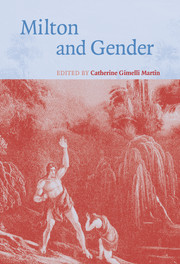Book contents
- Frontmatter
- Contents
- List of illustrations
- Notes on contributors
- Acknowledgments
- Abbreviations
- Introduction: Milton's gendered subjects
- PART I MASCULINITY, DIVORCE, AND MISOGYNY IN MILTON'S PROSE
- PART II THE GENDERED SUBJECTS OF MILTON'S MAJOR POEMS
- 4 The profession of virginity in A Maske Presented at Ludlow Castle
- 5 The genders of God and the redemption of the flesh in Paradise Lost
- 6 Transported touch: the fruit of marriage in Paradise Lost
- 7 The experience of defeat: Milton and some female contemporaries
- 8 Samson and surrogacy
- 9 “I was his nursling once”: nation, lactation, and the Hebraic in Samson Agonistes
- 10 “The Jewish Question” and “The Woman Question” in Samson Agonistes: gender, religion, and nation
- PART III GENDERED SUBJECTIVITY IN MILTON'S LITERARY HISTORY
- Index
7 - The experience of defeat: Milton and some female contemporaries
Published online by Cambridge University Press: 22 September 2009
- Frontmatter
- Contents
- List of illustrations
- Notes on contributors
- Acknowledgments
- Abbreviations
- Introduction: Milton's gendered subjects
- PART I MASCULINITY, DIVORCE, AND MISOGYNY IN MILTON'S PROSE
- PART II THE GENDERED SUBJECTS OF MILTON'S MAJOR POEMS
- 4 The profession of virginity in A Maske Presented at Ludlow Castle
- 5 The genders of God and the redemption of the flesh in Paradise Lost
- 6 Transported touch: the fruit of marriage in Paradise Lost
- 7 The experience of defeat: Milton and some female contemporaries
- 8 Samson and surrogacy
- 9 “I was his nursling once”: nation, lactation, and the Hebraic in Samson Agonistes
- 10 “The Jewish Question” and “The Woman Question” in Samson Agonistes: gender, religion, and nation
- PART III GENDERED SUBJECTIVITY IN MILTON'S LITERARY HISTORY
- Index
Summary
This chapter situates Milton's “experience of defeat” in relation to that of sectarians, particularly female visionaries who in the 1650s and '60s contributed to a literature of suffering. In the early modern period, England subsumed the history of ancient Israel into its national providential narrative, which for dissenters and millenarians was to culminate in a temporal regnum Christi. Male and female prophetic writers originally subscribed to this notion of England's chosen or “peculiar” status, but already in the 1650s went on to lament the nation's failure to live up to its early promise. The concept of election in fact demanded constant adjusting in the face of shifting personal and national events, including the “experience of defeat,” which Christopher Hill and Marxist historians of early modern England identify with the failure of the Good Old Cause.
In his influential study of the response of Milton and male radicals to the aftermath of the revolution, Hill admits: “I was disappointed not to be able to find any woman who left adequate evidence of her experience of defeat.” Since women were valued members of the religious sects, Hill attributes the lack of records about women's testimonies, including those on personal and political defeat, to the general dearth of information about women in the period. He nevertheless canvasses a number of possible female candidates, among them Margaret Fell, Mary Cary, Anna Trapnel, and Aphra Behn, who might have participated in the development of such a tradition.
- Type
- Chapter
- Information
- Milton and Gender , pp. 133 - 152Publisher: Cambridge University PressPrint publication year: 2005

